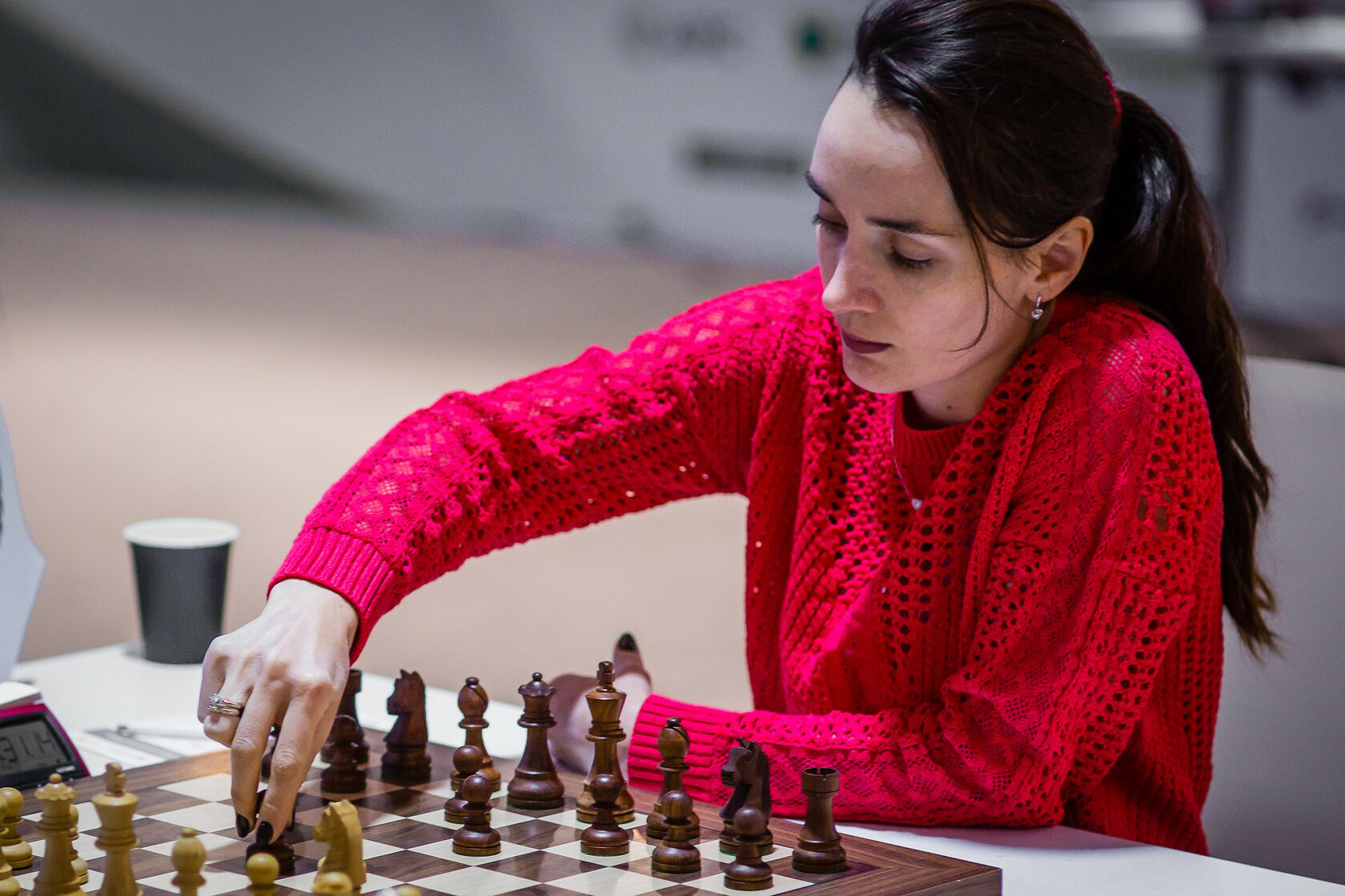The Kazakhstan Chess Federation, in close collaboration with FIDE, is leaving no stone unturned in their desire to provide a clean and safe environment for the Women's Grand Prix in Astana. One of the main concerns is guaranteeing that the players feel comfortable as soon as they arrive at the Astana Business Hub.
The venue is spacious and well-lit, and players can access a special rest area with beverages, fruit and sweets. High-tech digital boards and clocks are being used for the games, and three different types of chairs are provided.
With regard to anti-cheating, guarantees are solid. Among other measures, no spectators are allowed in the playing area, all participants are scanned before the game and randomly after the game, and there is a 15-minute delay on the live broadcast.
Games will be won or lost, but from my point of view, both the hotel and the venue conditions are excellent.
RESULTS OF ROUND 9
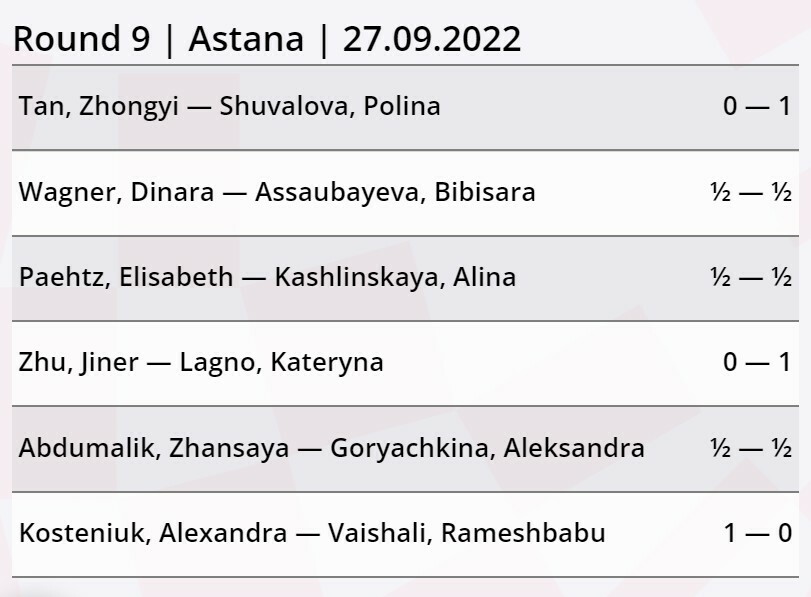
Abdumalik, Zhansaya — Goryachkina, Aleksandra (0.5-0.5)
In the first game to finish, Zhansaya Abdumalik and Aleksandra Goryachkina repeated a well-known theoretical draw in the Ruy Lopez. Abdumalik scores half a point against the tournament leader while Goryachkina stays in the lead and saves energy for tomorrow's important game against Kosteniuk.
As a side note, Aleksandra turns 24 tomorrow: a chance to celebrate with a quiet birthday dinner. However, this result did give Kateryna Lagno the chance to move into the sole lead if she defeated Zhu Jiner: stay tuned to find out!
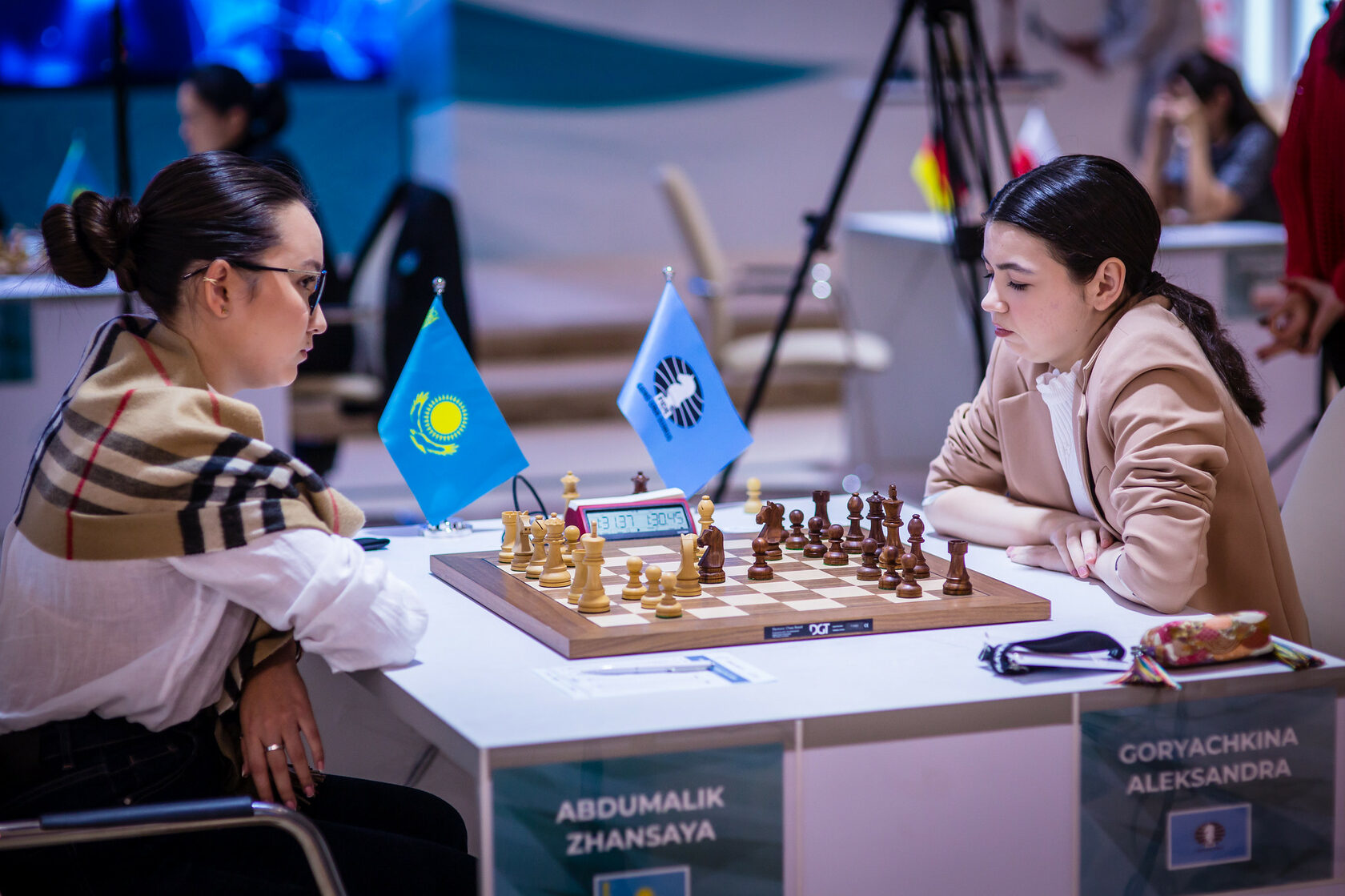
Tan, Zhongyi — Shuvalova, Polina (0-1)
Although they have never faced each other in classical chess over the board, Tan Zhongyi defeated Polina Shuvalova by 17-10 in a gruelling 27-game match in the 2022 Women's Speed Chess Main Blitz.
Shuvalova decided to repeat the Nimzo-Indian defence that she already used against Kashlinskaya in the fifth round, but Tan Zhongyi quickly deviated from the main line, going for a solid Ragozin exchange setup. Soon a d4-isolani position appeared on the board: active play for White's pieces in exchange for the weak d4 isolated pawn.
The crucial moment was when Tan Zhongyi invaded the seventh with her rook, which was a double-edged idea. Shuvalova tried to trap it, and in mutual time-trouble peppered with mutual errors, she managed to outplay her opponent and score her second win in a row.
Wagner, Dinara — Assaubayeva, Bibisara (0.5-0.5)
I could only locate two previous games between these two contenders: a win and a draw in favour of Wagner. With both players on 3.5/8, a win in this important game would catapult one of them to 50%.
For today's game, Assaubayeva, with Black, went for the popular Schallopp variation in the Slav defence: a new opening in this event. Possibly surprised by Wagner's 10.0-0-0 (both 10.h3 and 10.g3 are far more common), Assaubayeva uncorked the unexpected novelty 10…a5!? And Wagner allowed the pawn to advance to a3, a thorn in the side of her castled king.
After the exchange of queens, the game remained balanced for a while. Assuabayeva took advantage of Wagner's deep time trouble to win a pawn, and even went into a rook ending with two extra pawns.
But as they say, "All rook endings are drawn", and today's endgame wasn't an exception.
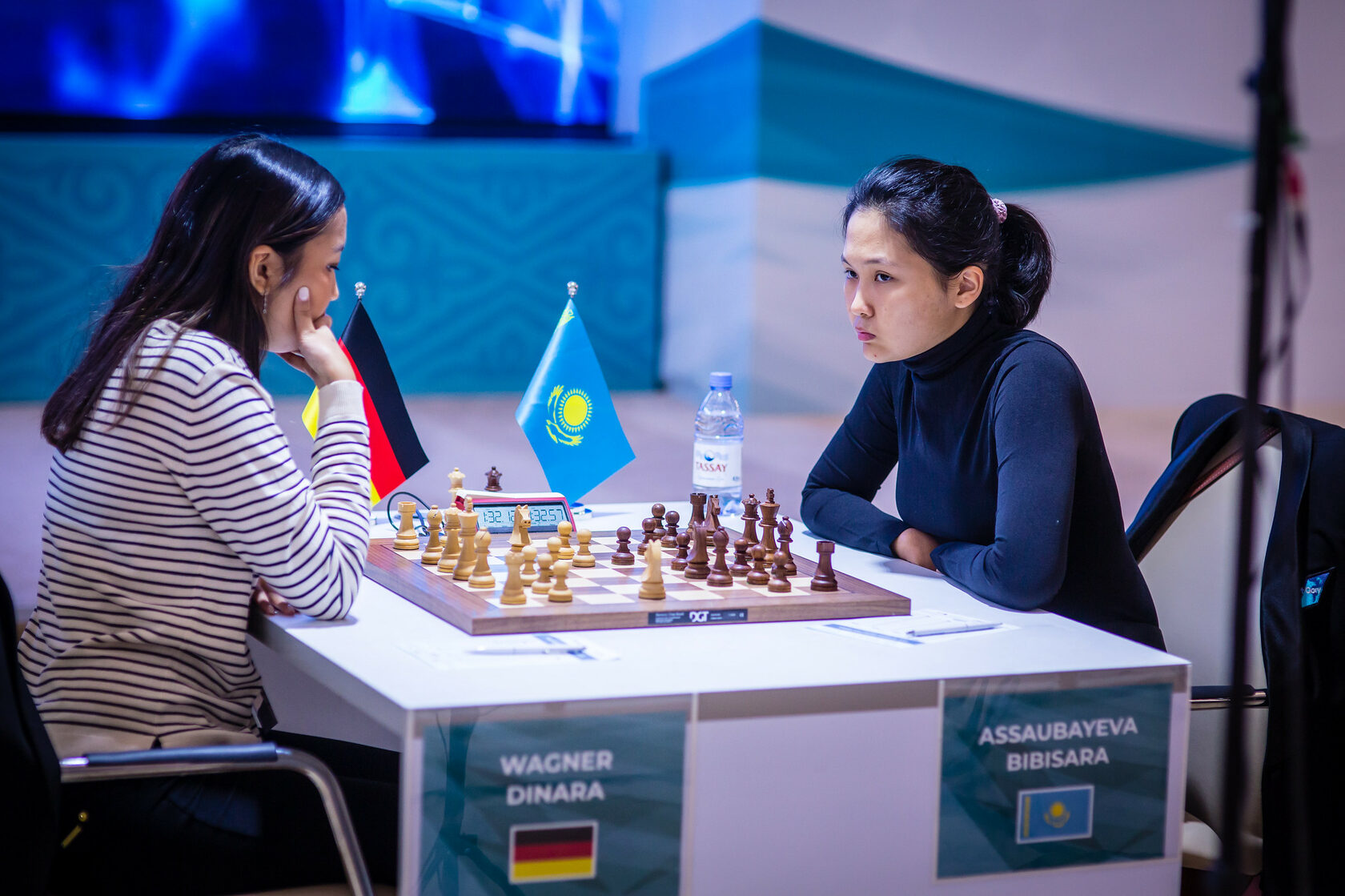
Paehtz, Elisabeth — Kashlinskaya, Alina (0.5-0.5)
The German number one female player has generally had good results when facing Poland's number one. According to the database, they have played classical games five times, with a four to one favourable score for Elisabeth.
For the first time in this tournament, Kashlinskaya went for the Nimzo-Indian defence, against which Paehtz chose the popular Bd3-Nge2 setup. After the adventurous 8…e5!?, Paehtz spent 22 minutes evaluating the consequences of grabbing a pawn with 9.Bxf7+ and more than half an hour to calculate 12.Nf4, played back in 2010.
It's unclear whether the pawn sacrifice was preparation – you can argue that there is some compensation for Black – but at least Kashlinskaya was well ahead on the clock. Given her impending time trouble, Paehtz decided to return the extra pawn for an easier game, and after some more exchanges, a peaceful draw was agreed.
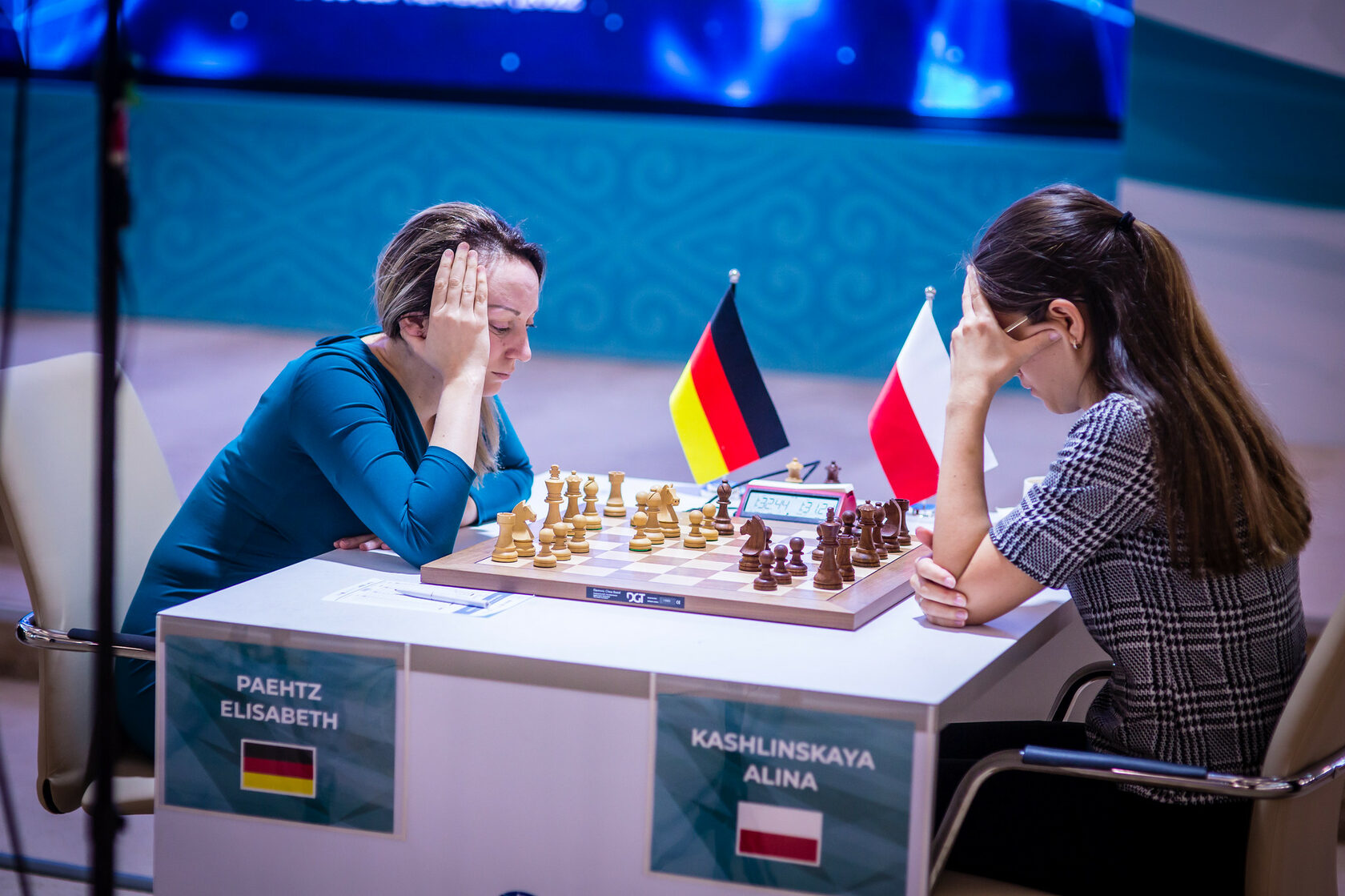
Zhu Jiner — Lagno, Kateryna (0-1)
In their first game face-to-face, Lagno went for the Four Knights Sicilian, which Elisabeth Paehtz has already used a couple of times in this tournament. Zhu Jiner chose the main line with White, but Lagno had prepared a reputable side-line (8…Bb7 instead of 8…Qc7).
Zhu Jiner wasn't caught by surprise. She blitzed out the best moves according to modern theory, momentarily sacrificing a pawn along the way. Lagno returned the pawn a few moves later, and the position remained equal.
According to the computer, Zhu Jiner missed a huge chance with 25.a4! (instead of 25.Rc4) with the idea of 26.f5 and 27.Nxd7 in many variations. I also discussed these variations with Lagno before her interview, and she sensed that she might be in danger.
However, Zhu Jiner wasn't on her day and had a blackout. She went for a direct tactical attack but missed that after 28.exf6? she was losing the bishop on c5, which wasn't hanging before. After losing two games in a row (against the two leaders), she still maintains her third place but is no longer a contender for the top spot in Astana.
With this win, Lagno is the sole leader, half a point ahead of Aleksandra Goryachkina. But with two games to go, anything can happen, as she reminded us in her post-game interview.
Kosteniuk, Alexandra — Vaishali, Rameshbabu (1-0)
In spite of only having played one classical game (which ended in a draw), Kosteniuk and Vaishali clashed in one of the rounds of the 2020 Women's Speed Chess Championship, which Kosteniuk won by 7-4.
Against Vaishali's Sicilian Defence, Kosteniuk went for the Rossolimo Attack and achieved a small edge in the opening. It's hard to say exactly where Vaishali could equalise: the computer suggests that Bd6 on moves 16 or 17, heading for a slightly better ending, were preferable options for White.
Vaishali generally doesn't get into time trouble, thanks to her excellent preparation and concentration. But today, Kosteniuk put on the pressure, and the Indian player eventually blundered a pawn and soon after a nice tactical shot to her king.
Having finally recovered her luggage, it stands to see if a happy Kosteniuk can keep up the pace in the last two rounds, in which she faces the two leaders.
Standings after Round 9
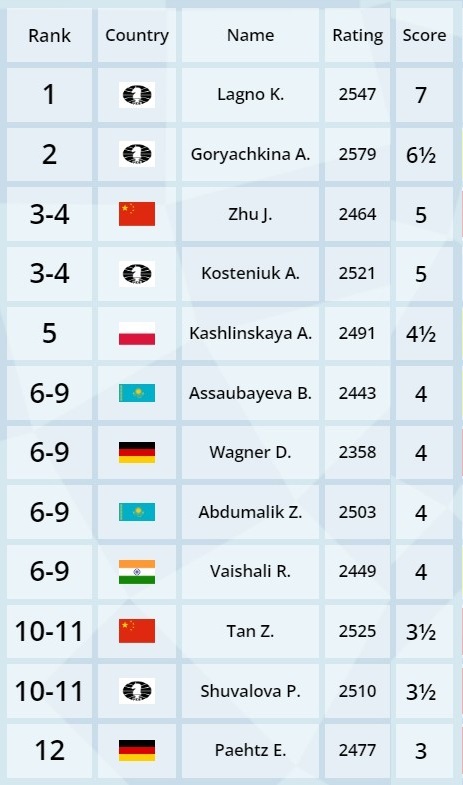
Round 10 | Astana | 28.09.2022
Shuvalova, Polina — Vaishali, Rameshbabu
Goryachkina, Aleksandra — Kosteniuk, Alexandra
Lagno, Kateryna — Abdumalik, Zhansaya
Kashlinskaya, Alina — Zhu, Jiner
Assaubayeva, Bibisara — Paehtz, Elisabeth
Tan, Zhongyi — Wagner, Dinara
Text and interviews: IM Michael Rahal, FIDE Press Officer, Astana
Photos: Anna Shtourman
